#NoCodeDeveloper
Explore tagged Tumblr posts
Text
The Best Tech Stack for Bubble Developers in 2025

Discover the most effective tech stack choices for Bubble developers in 2025 to enhance performance, scalability, and app capabilities. Stay ahead with the right tools tailored for no-code success.
#BubbleDeveloper#TechStack2025#NoCodeTools#BubbleApps#WebDevelopment2025#NoCodeMovement#BubbleTechStack#AppDevelopment#FutureOfDevelopment#NoCodeDeveloper
0 notes
Text
Why say NO to no code/low code App development?

The no-code ‘movement’ has sort of taken up the programming world by storm. A 2024 report by Gartner notes that by 2025, 70% of all app development processes will leverage the low-code/no-code technologies to do this.
This extreme surge in its popularity relies on the commitment of standardizing app development. This empowerment would lead to building software without writing a single line of code.
Why do people choose no code development?
The following are some advantages offered by no-code technologies:
a) Increased Accessibility With no-code, one doesn’t require any prior knowledge, making app development heavily accessible to entrepreneurs, businesspersons, or simply anyone with a good idea.
b) Chasing the Speed This process streamlines the development, making space for quicker prototyping, and faster turnaround times compared to conventional coding practices.
c) Cost Reductions By eradicating the demand for a dedicated developer’s unique code, no-code technologies highly reduce the need for heavy investments.
d) Innovative Outlook Simply the ease of use brings forth a culture of constant experimentation. This furthers the capabilities of the human mind, while bringing innovative solutions to the market.
Now that we have understood the simple gist of its benefits, let’s look at certain instances where no-code is the highly preferred way of development.
Ideal Cases for No-Code
1. Internal Tools for Businesses No-code platforms are fantastic for building custom internal tools that automate repetitive tasks and improve team collaboration. They can also help companies create user-friendly dashboards & reporting systems to understand the KPIs and insights into internal operations.
For businesses with simple enterprise CRM systems, no-code platforms can prove to be cost-effective to manage customer interactions, track leads, and ultimately build a healthy customer relationship.
2. Building Minimum Viable Products (MVPs) No-code platforms allow for rapid prototyping, testing & iteration through a range of functionalities like the drag-and-drop & pre-built component. This work while developing MVPs to validate it with the market by using user insights to develop further.
By bypassing lengthy processes, no-code platforms allow quicker launches of the MVP. In turn, businesses get a first-mover advantage to capture the market early on.
3. Aiding the non-technical users No-code development supports an entire field of creators. Business users with zero to no coding experience can now build internal tools to increase workplace efficiency.
Business owners can secure fundings through this way without even hiring developers!
Such are the awesome ways of no-code. But hold on, let me burst this bubble of joy & ease, because no-code might not work for you always!

In this next section, we’ll be dwelling upon why exactly no-code technologies don’t live up to their standard of delivery while making today’s app. Let’s go!
When must you say NO to no-code?
1. If you want to create truly customizable applications
Here’s the truth- you probably won’t be able to create market-breaking apps using no-code.
Traditional methods of development offer far more control over the app’s architecture, developing a distinctive UX, as compared to no-code platforms.
Right now, the only thing that customers respect is ‘value’. More like, delivering exceptional value in every of your launches.
In app development, this ‘value’ can come out in different ways. It could be a user interface so intuitive it feels cutting-edge, or a suite of advanced features that leave competitors in the dust.
While no-code platforms do offer streamlined development for applications, the pre-existing templates & function don’t allow for a lot of customized solutions, or any unique features.
These readily available functionalities let go of product differentiation, leaving users with similar-looking subpar applications.
2. If you want to manage your assets efficiently
No-code platforms can introduce complexity to software development asset management. This is due to the nature of the components built.
A fast-paced development company requires robust security & asset management processes. These must cover all crucial assets (software, apps, etc), especially within compliance-heavy industries like banking.
By streamlining asset management, you can tighten application security, minimize errors, and ensure swift deployment of security patches using traditional methods of development.
3. If you want to build secure & trusted apps
To navigate the growing landscape of data security regulations and combat the ever-present threat of breaches, a comprehensive software development approach is a must.
Such an approach enhances data security and privacy through:
– Up-to-date software components
– Secure coding practices
– Meticulous code reviewing
– Rigorous testing with perspectives of security and compliance
– Effective project management
4. If you want to easily solve technological complexities
Traditional dedicated developers offer a composite view of solutions for technological complexities that arise. It allows them to develop a specialized expertise of programming languages, giving more room to custom solutions, optimized performance, scalability, security & long-term maintenance and support.
All these crucial aspects cater to trustable and robust applications that no-code simply can’t match.
5. If you want to win the rat race of cutting-edge tech
No-code platforms, while standardizing application development, often don’t fulfill the demands of cutting-edge technologies. They lack the adaptability to handle the deep logic & algorithms in AI/ML, or complex data analysis.
It’s like building a Tesla with drag-and-drop tools. These platforms don’t have the fine-tuned controls required to build complex applications.
6. If you want to control your code
No-code platforms might bring up situations of vendor lock-ins, limiting a developer’s access to the raw code. Proprietary tech, data siloes, less customization, and limited integrations- these issues exist while working with such platforms.
A developer may as well give up entire control of his application.
To ponder,
Reasons like these explain why going for the easier option is never the winning solution. All development methods must be analyzed every time by companies and dedicated developers alike to choose the optimal solution, and not the easy one.
Don’t misunderstand- it’s just the art of recognizing when to use no-code/low-code development.
As an IT services company, we recommend embracing these tools for rapid prototyping, simpler applications, or internal cases. But, for core business and client applications that demand performance or intricate functionalities, a dedicated developer’s expertise in crafting robust, customizable code remains irreplaceable.
Trust our established expertise as an app development company for your next project!
With a team of over 350+ tech experts, we give free consultations to get your ideas in the market. Our expertise shows through with us being trusted by our clients ranging from Fortune 500 companies like My VI, Praaj, Utec by UltraTech to Startups as well.
Check out our client success stories to know more!
Click here for a free consultation today! Reference
#mobile app development#mobile application development#mobile app developer company#mobile application testing#low code app development#no code development#buildanappwithoutcode#lowcodeapplication#nocodeapplication#lowcodeapp#appswithoutcode#nocodedeveloper#buildmobileappwithoutcoding#lowcodeapplicationdevelopment#nocodemobileappdevelopment#lowcodetechnology#lowcodeandroidappdevelopment
0 notes
Text
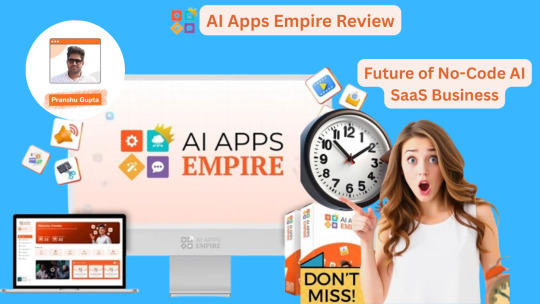
AI Apps Empire Review: The Future of No-Code AI SaaS Business
Introduction: AI Apps Empire Review
Artificial intelligence is changing industries as businesses invest in AI solutions. AI Apps Empire lets you enter the $100 billion AI market without coding or hiring developers. This tool helps you create, brand, and sell AI apps in just 60 seconds.
If you want to launch AI apps but lack technical skills, this is your chance. In this review, we’ll explain how AI Apps Empire works and how you can start your own AI SaaS business today.
Overview: AI Apps Empire Review
Vendor: Pranshu Gupta
Product: AI Apps Empire
Launch Date: 2025-Apr-04
Front-End Price: $17
Bonus: Yes, Huge
Discount: APPS2 – $2 on Entire Funnel
Niche: Affiliate Marketing, Artificial Intelligence (AI), Ai App Creator
Guarantee: 30-day money-back guarantee
Recommendation: Highly recommended
Support: Check
What is AI Apps Empire?
AI Apps Empire is a no-code AI app builder that lets anyone create, customize, and sell AI-powered apps. It offers an easy drag-and-drop system and 250+ ready-made AI app templates for different industries. Even beginners can use it to launch a profitable AI SaaS business quickly.
#AIApps#NoCode#SaaS#AI#TechReview#BusinessInnovation#FutureOfWork#Entrepreneurship#DigitalTransformation#AIRevolution#Startups#TechTrends#BusinessGrowth#Automation#SoftwareDevelopment#OnlineBusiness#AIForEveryone#TechEntrepreneur#ProductivityTools#BusinessStrategy#AIApplications#NoCodeDevelopment#SaaSBusiness
1 note
·
View note
Text
Build a Website: With Code vs. Without Code – Which is Right for You?
In today’s digital-first world, having a website is more important than ever. Whether you’re a student showcasing your projects, a professional building your portfolio, or a business expanding its online presence, the big question remains: Should you build a website with custom website development or without writing a single line of code?
Both approaches have their pros and cons, and your choice depends on your needs and goals. In this blog, we’ll explore both options, compare their features, and help you decide the best way to build your responsive website. Let’s get started!
What is a Website?
A website is like your digital home. It’s where your audience learns about you, interacts with you, and engages with your content. Think of it as your online identity—a space that’s accessible 24/7 to showcase your work, sell your products, or connect with your community.
Why Do You Need a Website?
Visibility: Be found online by your target audience with SEO optimization.
Credibility: A professional website design boosts trust.
Engagement: Connect with visitors and build lasting relationships.
Growth: Scale your business or brand globally with e-commerce solutions.
Option 1: Building a Website Without Code
No-code platforms have revolutionized the web development space. They allow you to create a functional website without needing any technical expertise.
Popular No-Code Platforms
Wix: Intuitive drag-and-drop editor, perfect for beginners.
Squarespace: Sleek, creative designs for portfolios and small businesses.
WordPress (with Plugins): A versatile platform for blogs and small businesses.
How It Works
Choose a Template: Pick from pre-designed layouts that suit your needs.
Drag and Drop Elements: Add text, images, forms, and more—no coding required.
Customize Your Site: Personalize the design with your branding.
Publish Your Website: Launch your site with just a click.
Pros of No-Code Platforms
Ease of Use: Ideal for beginners and non-tech-savvy users.
Quick Setup: Build a website in hours or days instead of weeks.
Cost-Effective: Affordable for individuals and small businesses.
Cons of No-Code Platforms
Limited Customization: Restricted flexibility for unique designs or features.
Scalability Issues: Struggles with handling large-scale projects.

Popular No-Code Platforms
Wix: Intuitive drag-and-drop editor, perfect for beginners.
Squarespace: Sleek, creative designs for portfolios and small businesses.
WordPress (with Plugins): A versatile platform for blogs and small businesses.
Option 2: Building a Website With Code
Creating a website with custom website development gives you complete control over its design, functionality, and scalability. While it requires more effort, the results are worth it for those seeking a tailored and powerful online presence.
How It Works
Design Your Layout: Plan the structure and aesthetics of your site.
Write Code: Use HTML, CSS, and JavaScript to build the front-end.
Develop the Backend: Use frameworks like Node.js or Django for advanced functionality.
Optimize and Launch: Test, debug, and deploy your website for the world to see.
Pros of Coding Your Website
Full Customization: Build a unique website design tailored to your needs.
Better Performance: Optimize for speed, SEO, and user experience.
Scalability: Add features and expand effortlessly as your business grows.
Security: Implement robust measures to protect user data.
Cons of Coding Your Website
Time-Consuming: Development takes weeks or months to complete.
Requires Expertise: You’ll need coding knowledge or professional help.
Higher Initial Cost: Custom development can be more expensive upfront.

Comparison: With Code vs. Without Code
Ease of Use:
No-Code Platforms: Beginner-friendly and easy to use.
Custom-Coded Websites: Requires technical expertise.
Cost:
No-Code Platforms: Affordable for small projects.
Custom-Coded Websites: Higher upfront cost.
Customization:
No-Code Platforms: Limited design and feature flexibility.
Custom-Coded Websites: Unlimited customization possibilities.
Performance:
No-Code Platforms: Slower due to platform limitations.
Custom-Coded Websites: Optimized for speed and performance.
Scalability:
No-Code Platforms: Suitable for simple or smaller sites.
Custom-Coded Websites: Ideal for handling complex and large-scale projects.
Security:
No-Code Platforms: Provides standard security measures.
Custom-Coded Websites: Advanced and customizable security features.
Why You Should Prioritize Coding for Your Website
While no-code platforms are great for getting started quickly, custom website development offers unmatched long-term value. It represents professionalism, provides a seamless user experience (UX), and adapts to the evolving needs of your business.
Benefits for Businesses
A coded website represents professionalism, provides a seamless user experience (UX), and can adapt to the evolving needs of your business.
Benefits for Students and Professionals
A custom-coded portfolio or blog showcases your technical skills and helps you stand out in competitive job markets.

How KSoft Technologies Can Help You
At KSoft Technologies, we specialize in both no-code and custom-coded solutions, offering tailored services to meet your unique needs.
Why Choose Us?
Custom Website Development: Fully personalized websites designed for you.
Optimized Performance: Fast-loading, SEO-friendly websites.
Advanced Features: From e-commerce solutions to web application development.
Website Maintenance Services: Ongoing updates and support for long-term success.
Conclusion: Your Path to the Perfect Website
Choosing between building a website with or without code depends on your goals, budget, and technical expertise. At KSoft Technologies, we’re here to help you achieve your vision—whether that’s through a quick no-code solution or a fully customized masterpiece.
So, what are you waiting for? Let’s bring your responsive web design to life. Visit KSoft Technologies today to start your journey!
#WebDevelopment#nocode#WebsiteDesign#CustomSolutions#KSoftTechnologies#BuildYourWebsite#DigitalPresence#NoCodeDevelopment#WebDevelopmentMadeEasy#WebsitesForBusiness#ProfessionalDesign
1 note
·
View note
Text

We specialize in React Native, Flutter, and Bubble.io to create apps that deliver exceptional user experiences and drive business growth.
React Native: Efficient cross-platform solutions
Flutter: Beautifully crafted, high-performance apps
Bubble.io: No-code development for swift implementation
Get a Free Consultation to explore your ideas and see how we can help.
#ConnectInfosoft#MobileAppSolutions#ReactNative#Flutter#BubbleIO#CrossPlatformApps#NoCodeDevelopment#UserExperience#BusinessGrowth#AppDevelopment#TechInnovation#DigitalTransformation#MobileApps#AppDesign#TechSolutions#EfficientDevelopment#HighPerformanceApps#SwiftImplementation#TechExperts#AppCreators#CustomApps#AppInnovation#ModernApps#TechDriven#MobileTech#CreativeSolutions#AppExcellence#NextGenApps#usa#india
3 notes
·
View notes
Link
#AppSenzaCodice #NoCodeDevelopment #StrumentiNoCode #AppMobile2025 #SviluppoApp #TecnologiaSemplificata #InnovazioneDigitale #BusinessApp
0 notes
Text
What to Expect from Leading Web Development Companies
Introduction
The web development industry is evolving faster than ever, and 2025 promises to be a game-changer. With rapid advancements in AI, user experience, and security, leading web development companies are adopting new technologies and strategies to stay ahead. If you’re a business owner or a developer, understanding these trends can help you prepare for the future.
1. AI-Powered Development
Artificial Intelligence is not just a buzzword anymore it's reshaping how websites are built and managed. In 2025, top web development companies are using AI for everything from code generation to personalized content delivery. AI tools can now suggest layouts, improve SEO, and even detect bugs in real-time. This increases productivity and improves website performance.
2. Progressive Web Apps (PWAs)
PWAs continue to grow in popularity. They combine the best of websites and mobile apps fast loading, offline access, and push notifications. Businesses are investing in PWAs to improve user engagement and reduce development costs. In 2025, expect more companies to replace native apps with responsive, cross-platform PWAs.
3. Voice and Visual Search Integration
With smart speakers and visual search tools on the rise, websites are being optimized for more than just text. Leading web development companies are now building sites that respond to voice commands and recognize images. This trend is especially useful for eCommerce websites where users want faster, easier ways to find products.
4. No-Code and Low-Code Development
In 2025, the demand for faster website delivery has led to the rise of no-code and low-code platforms. These tools allow businesses to launch sites without complex coding. While custom coding is still essential for high-level applications, web development companies are integrating no-code solutions for smaller projects or quick MVPs (Minimum Viable Products).
5. Enhanced Cybersecurity Measures
With increasing cyber threats, website security is more important than ever. Top web development companies now prioritize secure coding practices, regular audits, and compliance with global data protection laws. In 2025, expect more websites to come with built-in SSL, two-factor authentication, and AI-powered security monitoring.
6. Sustainable Web Design
Eco-conscious web development is a rising trend. Companies are building faster, cleaner websites that consume less energy and reduce server loads. Optimizing images, using green hosting, and writing efficient code contribute to a lower carbon footprint, a growing priority for socially responsible brands.
7. Focus on Accessibility
Making websites accessible to everyone, including people with disabilities, is no longer optional. Leading companies are now ensuring compliance with WCAG (Web Content Accessibility Guidelines), using tools that audit and improve accessibility during development.
Conclusion
The future of web development in 2025 is all about smarter, faster, and more inclusive experiences. Companies that embrace these trends from AI integration and PWAs to cybersecurity and accessibility will not only deliver better websites but also lead the digital transformation across industries. If you're planning to hire a web development company, make sure they’re aligned with these emerging trends to stay competitive and future-ready.
#WebDevelopment2025#FutureOfWebDevelopment#AIInWebDevelopment#ProgressiveWebApps#VoiceSearchOptimization#NoCodeDevelopment#Cybersecurity2025#SustainableWebDesign#AccessibleWeb#WebDevelopmentTrends#DigitalTransformation#CustomWebDevelopment#WebDesignInnovation#PWATrend#InclusiveDesign
0 notes
Text
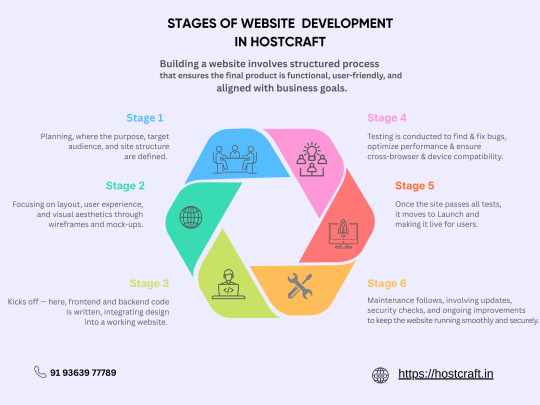
Website development follows key stages: Planning defines goals and structure. Design focuses on layout and user experience. Development turns designs into code for functionality. Testing ensures performance and fixes bugs. Launch makes the site live, and Maintenance keeps it updated and secure. Each step ensures a smooth, user-friendly, and effective website.
#webdevelopment#smartwebdesign#aiwebsitebuilders#artificialintelligence#nocodedevelopment#webdesign#websitebuilder
0 notes
Text

🚀 Ready to empower your business with no-code solutions? Microsoft Power Apps is the perfect tool for building custom apps without any programming experience. In our latest blog, we explore how Power Apps can revolutionize your workflow, improve efficiency, and increase productivity. Whether you're a beginner or an expert, our guide will help you get started with ease.
#Exinent#MicrosoftPowerApps#NoCodeDevelopment#BusinessSolutions#ProductivityBoost#TechInnovation#EmpowerYourBusiness
0 notes
Text

Compare FlutterFlow vs Bubble for business apps. See which no-code platform wins for mobile or web development features, pricing, and scalability.
0 notes
Text
Beginner’s Guide to No-Code App Development with Bubble.io
Learn how to build powerful web apps without coding using Bubble.io in this beginner-friendly guide. Discover key features, tools, and step-by-step tips to kickstart your no-code development journey.
#BubbleIO#NoCodeDevelopment#NoCodeApps#BeginnerGuide#AppDevelopment#BuildWithoutCode#NoCodeTools#StartupTech#TechForBeginners#WebApps
0 notes
Text
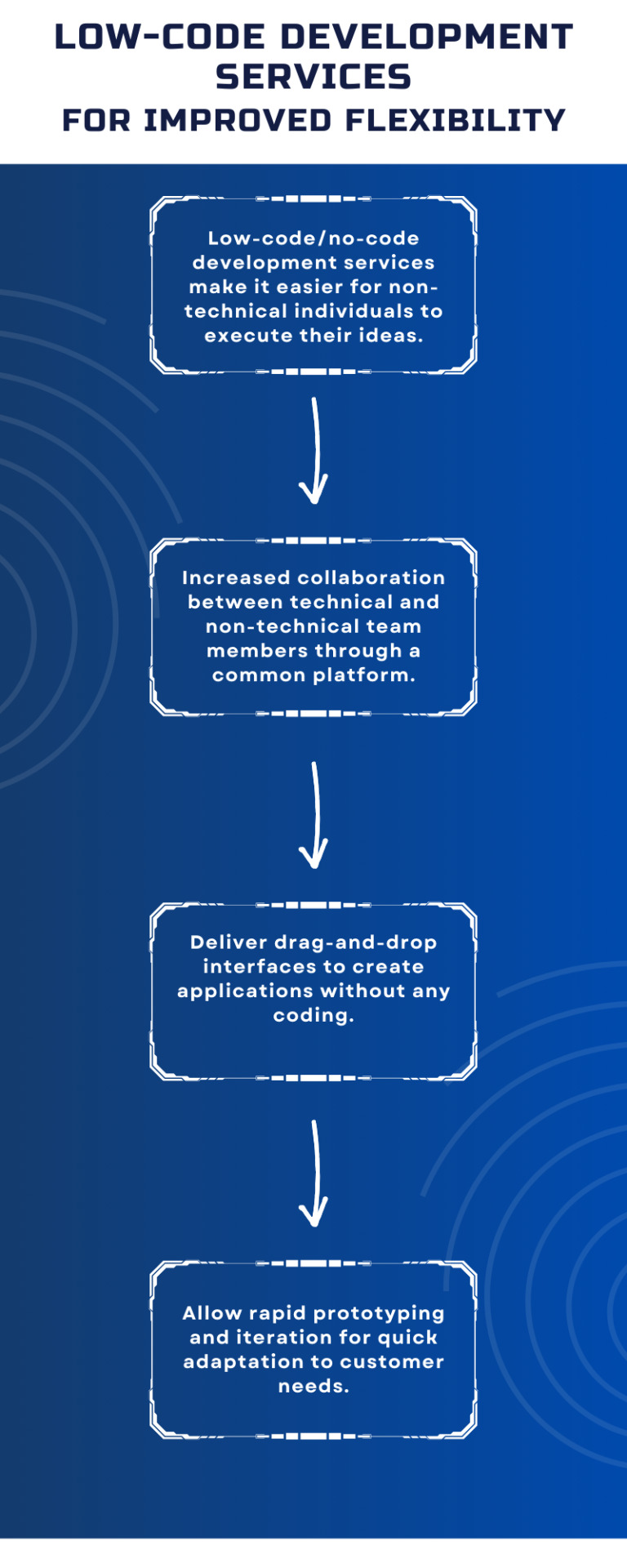
Low-code and no-code development platforms are a boon for non-technical people who want to build and launch their own applications without facing any technical barriers.
Explore more: https://www.veetechnologies.com/services/it-services/product-and-application-development/low-code-no-code-development-services.htm
#NoCode#LowCode#NoCodeDevelopment#LowCodeDevelopment#NoCodeSolutions#LowCodeSolutions#BuildWithoutCode#NoCodeAgency#LowCodeExperts#NoCodeServices
0 notes
Text
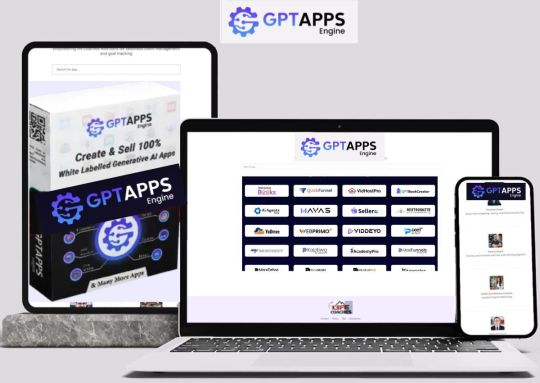
GPT Apps Engine Best Review: Unveiling the Ultimate No-Code Generative AI Solution
Introduction: GPT Apps Engine Best Review
There’s always some specific problem in the field of business and creativity where artificial intelligence can help businesses find solutions that will contribute to their growth. Take the GPT Apps Engine, a new one of its kind no-code platform that lets anyone create 100% white label 60 secs generative AI apps and never again hire expensive developers, or grapple with complications. This product is a state-of-the-art application builder that has over 225 pre-build applications, that comes with done-for-you applications, native multi-lingual support, and an intelligent AI-generated personalization tool to create and sell AI applications.
Regardless of whether you’re a marketer, an agency, or an entrepreneur, with GPT Apps Engine you can generate and monetize AI apps for $1000+ per app. Well, without further ado – let’s have a closer look at its capabilities, advantages, and the reasons why this is one of the best platforms out there.
Overview: GPT Apps Engine Best Review
The product creator: Dr. Amit Pareek
Product name: GPT Apps Engine
Front-end price: $32
Product Official Page: Check
Bonus: Yes, Huge Bonuses
Niche: AI App
Guarantee: 30-Day Money Back Guarantee
Support: Mail to: [email protected]
What is GPT Apps Engine?
As explained, GPT Apps Engine is an AI app maker without coding that will help users deploy generative AI applications by focus area or industry. Designed for marketers, creators, and businesses, it provides tools to create:
White-labeled AI apps with custom branding.
Multilingual applications for global audiences.
Interactive tools that capture and convert leads.
AI-driven solutions for automation, personalization, and customer engagement.
That is why with GPT Apps Engine, you never have to engage in the tedious processes of app development anymore as your functional apps are created in minutes. This platform can incorporate such modern solutions as the advanced ChatGPT API models (GPT-3.5, GPT-4.0, GPT-4 Turbo).
#GPTAppsEngine#NoCode#GenerativeAI#AI#ArtificialIntelligence#MachineLearning#Technology#Innovation#Productivity#Efficiency#Automation#DigitalTransformation#AppDevelopment#Software#Review#UltimateSolution#NoCodeAI#AIApps#AIEngine#GPTReview#NoCodeDevelopment#AIInnovation#NoCodeSolutions#best
1 note
·
View note
Text
Turn Your Ideas into Applications Faster and Easier Than Before with Low-Code/No-Code Development Services

You can get your applications running within a few weeks using low-code/no-code development services, along with reduced development and maintenance costs. LCNC can scale as your business grows and free up your IT teams to focus on high-priority projects, reducing IT backlogs entirely.
Explore more: https://www.veetechnologies.com/services/it-services/product-and-application-development/low-code-no-code-development-services.htm
#NoCode#LowCode#NoCodeDevelopment#LowCodeDevelopment#NoCodeSolutions#LowCodeSolutions#BuildWithoutCode#NoCodeAgency#LowCodeExperts#NoCodeServices
0 notes
Text
Streamline Your Application Development with Low-Code Development Services
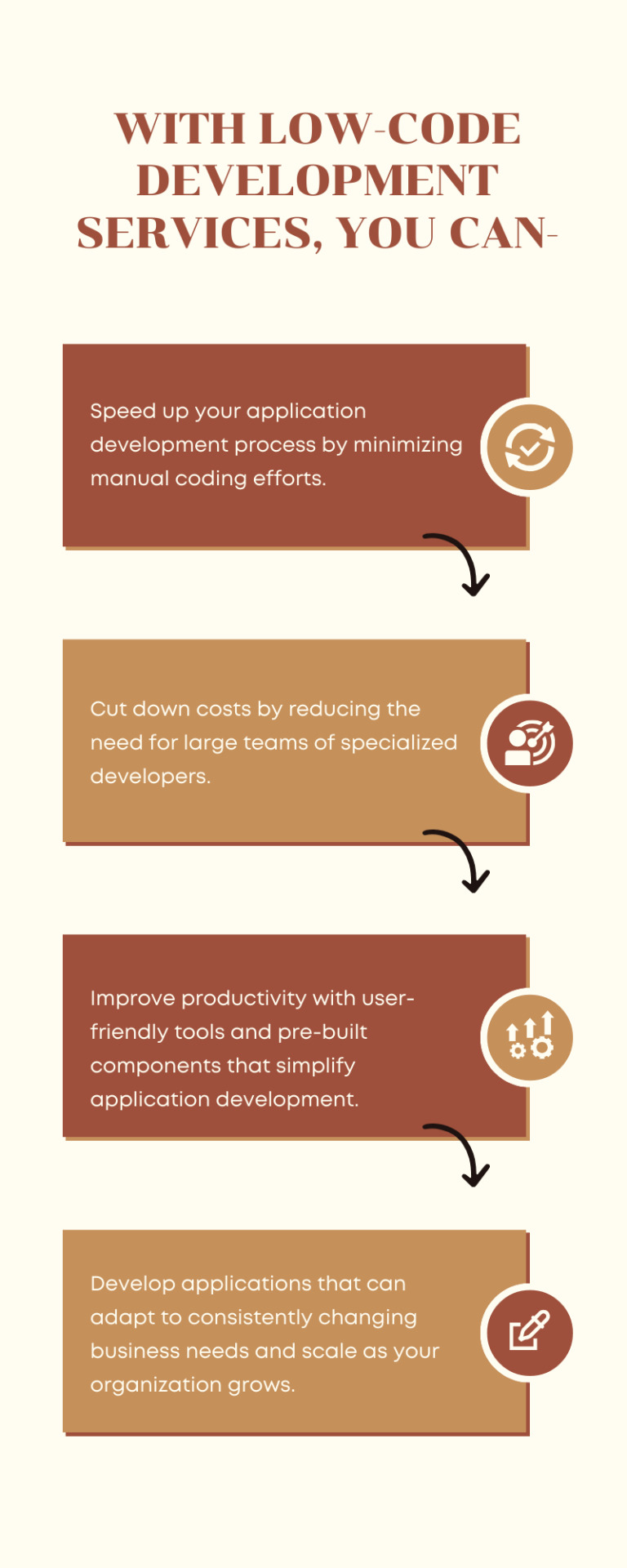
Businesses can reduce costs, increase productivity and simplify the complexity of the entire process using low-code/no-code development services. Explore More: https://www.veetechnologies.com/services/it-services/software-testing-services.htm
0 notes
Text
Influencing Software Development and Key Innovations in Low Code, No Code Services for 2025
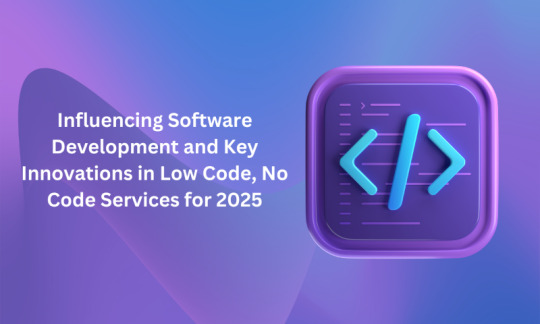
Building a software is a nightmare for many people as it generally involves coding. But nowadays, the reality is that anyone can build a software with low code and no code platforms.The main difference between these two are: low code requires minimal code which makes it suitable for developers who want to build complicated app faster, whereas no code requires no coding at all and is perfect for business users who want to create apps without having any technical expertise. As we are in 2025 now, these platforms are getting better and more helpful for various best application management and support companies.How Businesses Use Low Code and No Code PlatformsLet’s have a look at how different sectors and best application management and support companies are leveraging them:HealthcareHospitals use no code platforms to design patient management systems, which reduce administrative burden. AI integration helps in the processing of large datasets for medical research and diagnostics.RetailRetailers usually use low code tools to create customized e-commerce platforms and inventory management systems. Automated customer service chatbots also improve user experiences of best application management and support companies.EducationFor online learning and student monitoring, schools and universities are building applications. Administrative tasks like admissions and fee management are organised using automation.
#LowCode#NoCode#LowCodeDevelopment#NoCodeDevelopment#AppDevelopment#SoftwareDevelopment#DigitalTransformation#Automation#BusinessInnovation#TechSolutions
0 notes